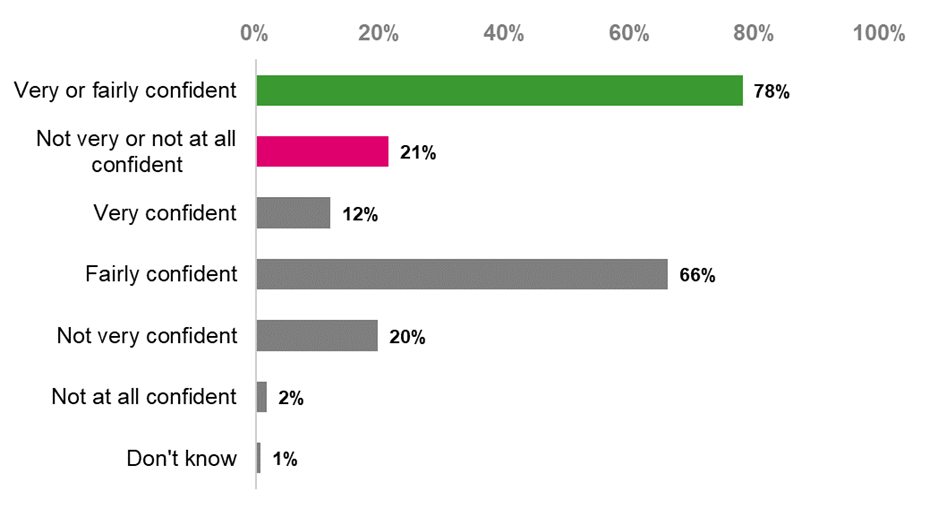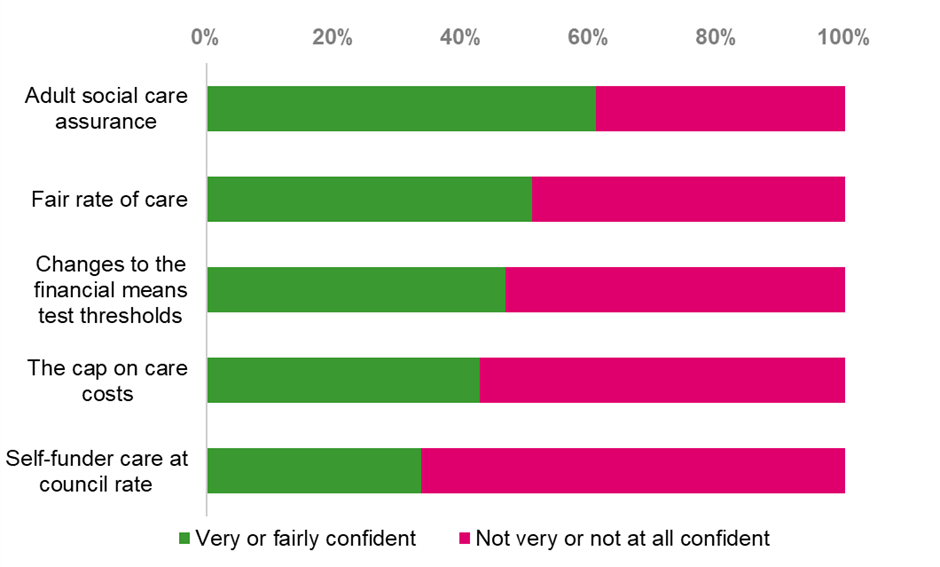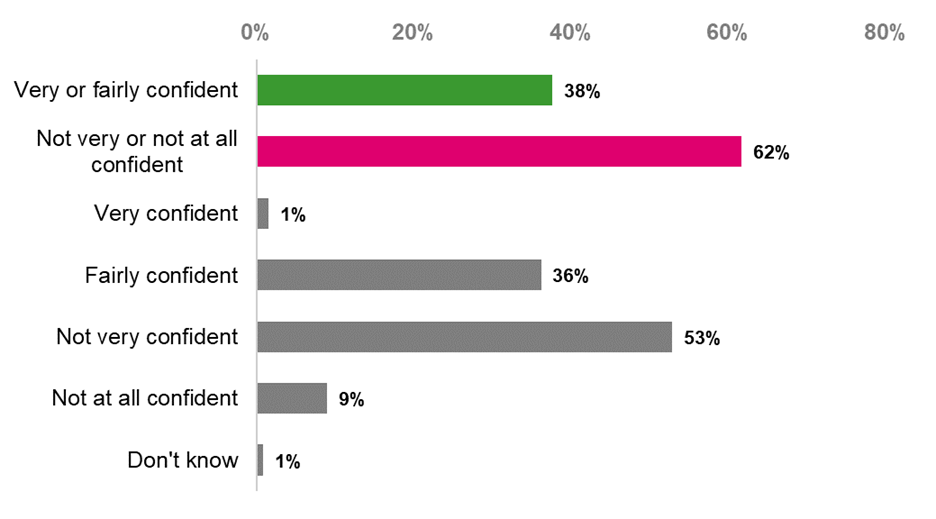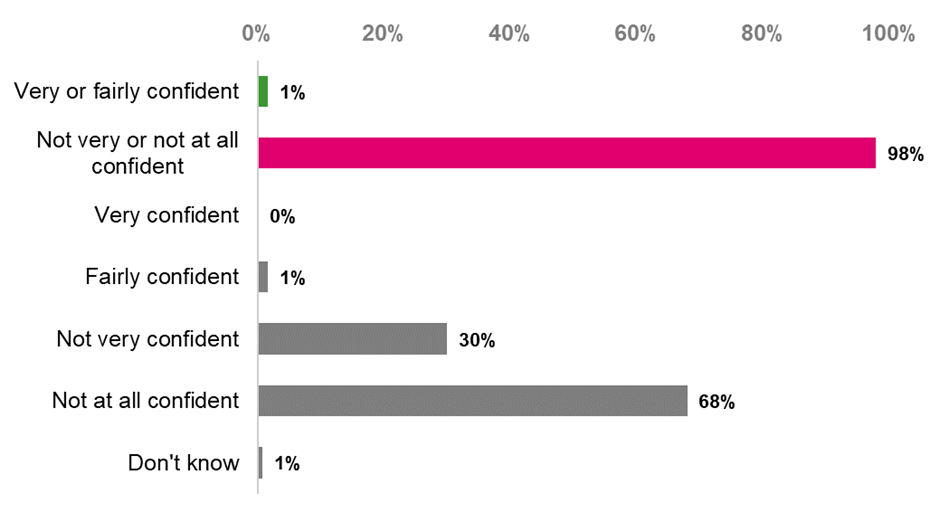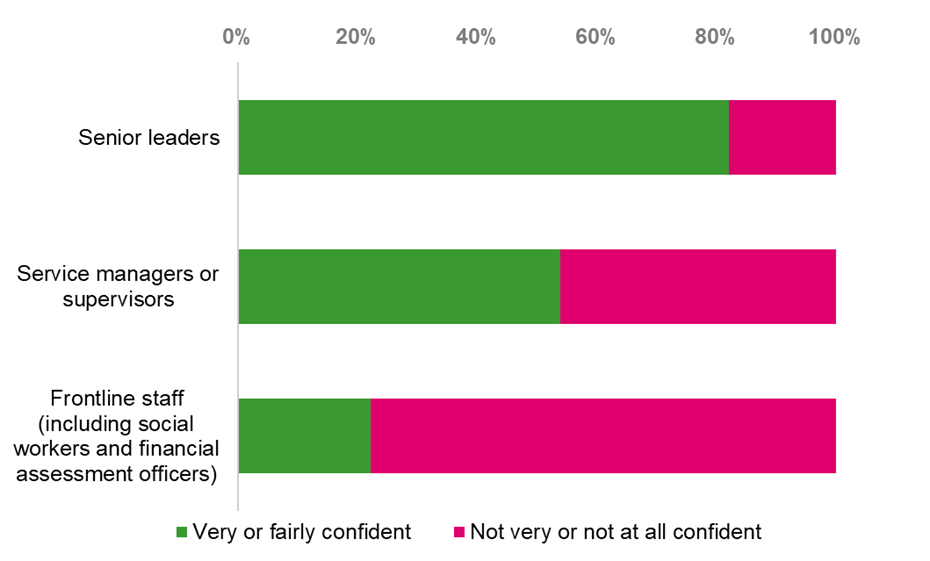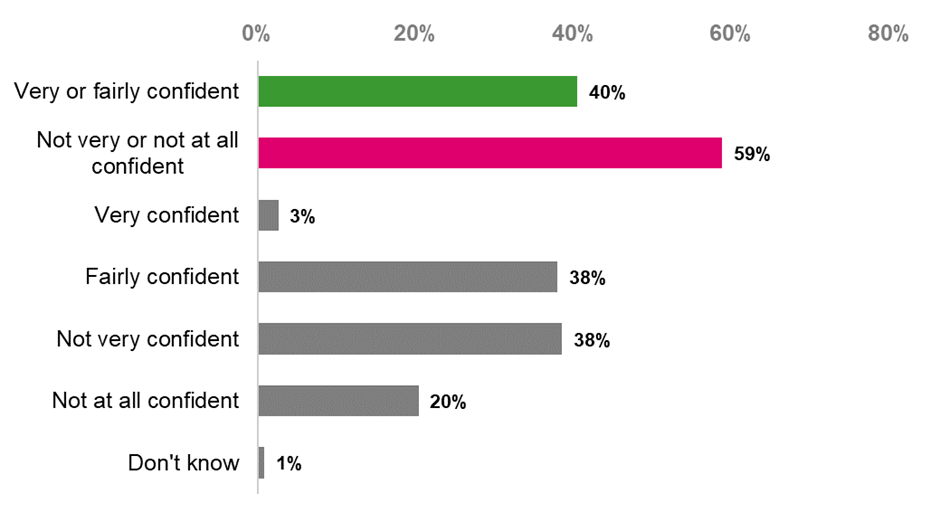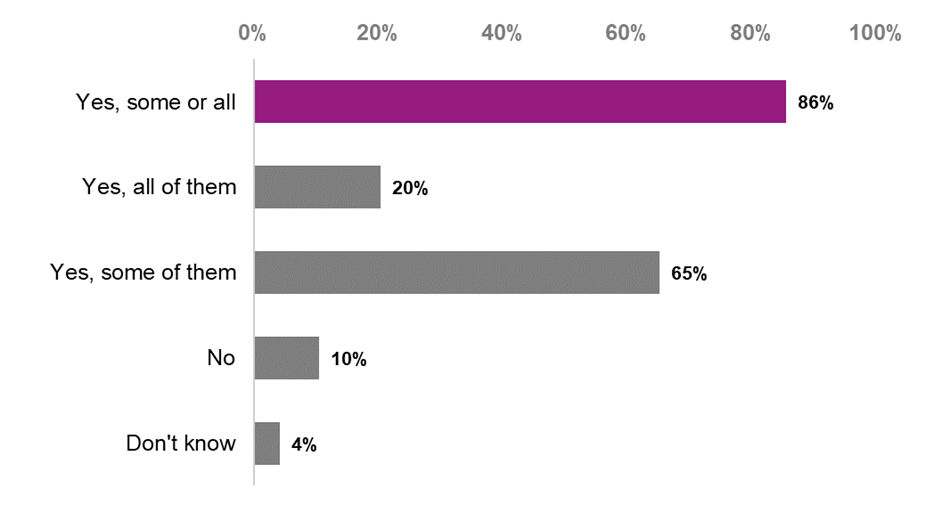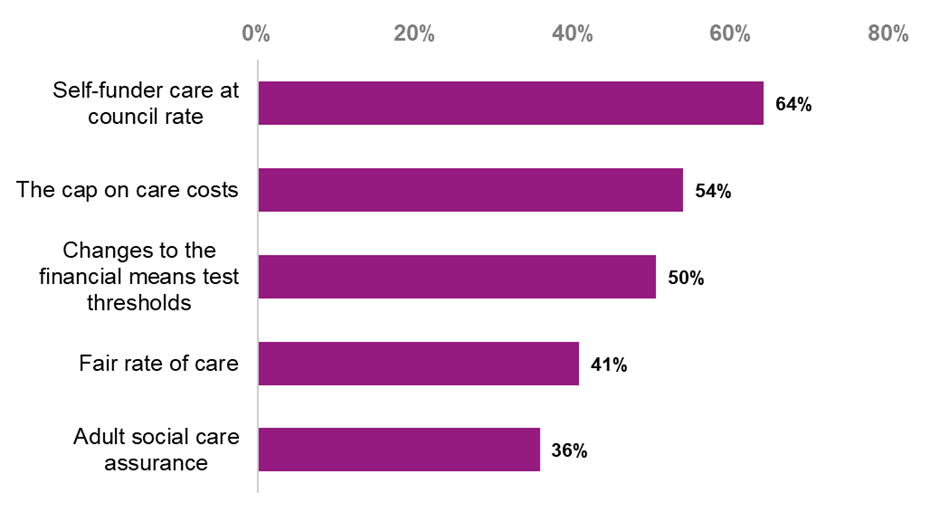Summary
Background
In June 2022 the Local Government Association (LGA) conducted a survey of the lead members for adult social care of all councils in England. The purpose of the survey was to assess levels of confidence in the upcoming adult social care reforms among senior council members. A total of 80 responded – a response rate of 53 per cent.
Key findings
- Seventy-eight per cent of respondents were very or fairly confident in their council’s ability to meet existing statutory duties in adult social care, disregarding future reforms, compared to 21 per cent who were not very or not at all confident.
- The aspects of the reforms which respondents expressed the greatest confidence in being able to deliver was adult social care assurance, which 55 per cent said they were very or fairly confident in their council’s ability to deliver within the government’s timetable.
- The aspect of the reforms which respondents were least confident in implementing to the government’s timetable was Section 18(3) of the Care Act, whereby self-funders can ask their council to arrange their care at the rate the council pays, with 66 per cent saying they were not very or not at all confident in delivering this aspect of the reforms.
- Thinking about all elements of the reforms, 62 per cent of respondents were not very or not at all confident in their council’s ability to deliver the programme to the government’s timetable.
- The vast majority (98 per cent) of respondents were not very or not at all confident that the government funding earmarked for the adult social care reforms is sufficient to deliver them.
- A large majority of respondents (81 per cent) were very or fairly confident in having the required staff capacity in terms of senior leaders to implement the reforms. Just over half (53 per cent) of respondents were very or fairly confident in having the required capacity in terms of service managers or supervisors, whilst 75 per cent of respondents were not very or not at all confident in having the required capacity in terms of social workers and financial assessment officers.
- Taking into account the wider health and care reforms, 59 per cent of respondents were not very or not at all confident in their council’s ability to deliver everything the government is asking of them in the coming year.
- A large majority (86 per cent) of respondents thought that some or all of the adult social care reforms should be delayed, including 20 per cent who thought that all of the reforms should be delayed and 65 per cent who thought that some of the reforms should be delayed.
- The reform which the most respondents thought should be delayed, at 64 per cent of respondents, was Section 18(3) of the Care Act, whereby self-funders can ask their council to arrange their care at the rate the council pays.
- The reform which the least respondents thought should be delayed, at 36 per cent of respondents, was adult social care assurance.
- Respondents’ comments focused on the difficulty of acquiring the necessary staff capacity for the reforms, the significant additional expenditure which the reforms are likely to require, the potential impact on other council services of delivering the reforms, and the simultaneous difficulties imposed by rising demand from deprivation, the ageing population, the rising cost of living and the ongoing impact of the COVID-19 pandemic.
Introduction
In June 2022 the Local Government Association (LGA) conducted an online survey of councillors with overall responsibility for adult social care across all councils in England. The purpose of the survey was to assess levels of confidence in the upcoming adult social care reforms among senior council members.
Methodology
From 6 to 23 June, the LGA’s Research and Information Team sent an online survey to councillors with a lead role in adult social care across single tier and county councils in England (that is, all councils excluding district councils). Of the 152 councils with responsibility for adult social care in England, a total of 80 replied – a response rate of 53 per cent.
Whilst these results should strictly be taken as a snapshot of the views of this particular group of respondents, rather than representative lead members for adult social care in local authorities, this level of response means that the results are likely to provide a good indication of the position of senior councillors in the sector more widely.
Table 1 shows the response rate by type of council. This demonstrates that the authority type with the highest response rate was county councils, at 58 per cent, whilst London boroughs had the lowest response rate, at 45 per cent.
Table 1: Response rate by type of council
|
Type of authority |
Total number |
Number of responses |
Response rate % |
|
County |
24 |
14 |
58 |
|
London borough |
33 |
15 |
45 |
|
Metropolitan district |
36 |
19 |
53 |
|
Unitary |
59 |
32 |
54 |
Table 2 shows the response rate by region. This shows that the region with the highest response rate was the South West, at 80 per cent, whilst the one with the lowest response rate was the North East, at 33 per cent.
Table 2: Response rate by region
|
Region |
Total number |
Number of responses |
Response rate % |
|
East of England |
11 |
5 |
45 |
|
East Midlands |
10 |
7 |
70 |
|
London |
33 |
15 |
45 |
|
North East |
12 |
4 |
33 |
|
North West |
23 |
13 |
57 |
|
South East |
19 |
8 |
42 |
|
South West |
15 |
12 |
80 |
|
West Midlands |
14 |
8 |
57 |
|
Yorkshire and Humber |
15 |
8 |
53 |
The above tables demonstrate that the responses are reasonably evenly spread across authority types and regions. The results have been weighted by authority type and region to correct for variations in responsiveness between these categories of local authority.
In addition, the following points should be noted about the research methodology:
- The bases from which percentages were calculated are unweighted, whilst the percentages themselves which feature in this report are weighted.
- Throughout the report percentages in figures and tables may add to more than 100 per cent due to rounding. Percentages are rounded to the nearest whole per cent.
Annex A: Questionnaire
If you are responding on behalf of more than one authority please note this in the 'authority' box below, but please check with us first whether a separate return is needed for each authority.
- Name (1) ________________________________________________
- Authority (2) ________________________________________________
- Job title (3) ________________________________________________
- Email address (4) ________________________________________________
1. How confident are you or not in your council's ability to meet existing statutory duties in adult social care in the coming year and within existing resources, disregarding future reforms?
- Very confident (1)
- Fairly confident (2)
- Not very confident (3)
- Not at all confident (4)
- Don't know (5)
2. How confident are you or not in your council's ability to deliver the following aspects of the adult social care reform programme to the Government's timetable?
|
|
Very confident (1) |
Fairly confident (2) |
Not very confident (3) |
Not at all confident (4) |
Don't know (5) |
|
The cap on care costs (1) |
|
|
|
|
|
|
Changes to the financial means test thresholds (2) |
|
|
|
|
|
|
Fair rate of care (3) |
|
|
|
|
|
|
Section 18(3) of the Care Act whereby self-funders can ask their council to arrange their care at the rate the council pays (4) |
|
|
|
|
|
|
Adult social care assurance (5) |
|
|
|
|
|
3. Overall, thinking about all elements of the reforms, how confident are you or not in your council's ability to deliver the programme to the government's timetable?
- Very confident (1)
- Fairly confident (2)
- Not very confident (3)
- Not at all confident (4)
- Don't know (5)
4. How confident are you or not that the government funding earmarked for the adult social care reforms is sufficient to deliver them?
- Very confident (1)
- Fairly confident (2)
- Not very confident (3)
- Not at all confident (4)
- Don't know (5)
5. How confident are you or not that your council will have the required capacity, either through existing staff or additional recruitment, to deliver the adult social care reforms?
Please provide an answer broken down by the following categories of staff.
|
|
Very confident (1) |
Fairly confident (2) |
Not very confident (3) |
Not at all confident (4) |
Don't know (5) |
|
Senior leaders (1) |
|
|
|
|
|
|
Service managers or supervisors (2) |
|
|
|
|
|
|
Frontline staff (including social workers and financial assessment officers) (3) |
|
|
|
|
|
6. Taking into account the wider health and care reforms, how confident are you or not in your council's ability to deliver everything the government is asking of you (existing statutory duties, social care reforms, and wider reforms and initiatives) in the coming year?
These reforms include, for example, those mandated by the Health and Social Care Act, Liberty Protection Safeguards (LPS) and increased collaboration with Integrated Care Systems (ICSs).
- Very confident (1)
- Fairly confident (2)
- Not very confident (3)
- Not at all confident (4)
- Don't know (5)
7. Finally, bearing in mind what you know about current demand duties, the timescale, funding and capacity available for the adult social care reforms, and the wider health reform agenda, do you think some or all of the adult social care reforms should be delayed?
- Yes, all of them (1)
- Yes, some of them (2)
- No (3)
- Don't know (4)
Which of the following reforms do you think should be delayed?
Please select all that apply.
- The cap on care costs (1)
- Changes to the financial means test thresholds (2)
- Fair rate of care (3)
- Section 18(3) of the Care Act whereby self-funders can ask their council to arrange their care at the rate the council pays (4)
- Adult social care assurance (5)
8. Please write in below any further comments on the topics covered by this survey which you would like to share with us.
________________________________________________________________
________________________________________________________________
________________________________________________________________
________________________________________________________________
________________________________________________________________
Once you press the 'Submit' button below, you will have completed the survey.
Many thanks for taking the time to complete this survey. You are in control of any personal data that you have provided to us in your response. You can contact us at all times to have your information changed or deleted. You can find our full privacy policy here: click here to see our privacy policy.

